National
Justice Dept. brief against DOMA lauded as ‘watershed moment’
Administration says law ‘unconstitutionally discriminates’
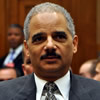
LGBT rights supporters are heralding a recently filed legal brief against the Defense of Marriage Act — the first of its kind against the anti-gay law from the Obama administration — as a landmark document that will aid in bringing about the end of DOMA.
Filed on July 1 by the Justice Department, the 31-page brief argues that Section 3 of DOMA, which prohibits federal recognition of same-sex marriage, is unconstitutional because laws related to sexual orientation under precedent of the U.S. Supreme Court should be subject to heightened scrutiny, or must be shown to advance a significant government interest to stay on the books.
“Section 3 of the Defense of Marriage Act … unconstitutionally discriminates,” the brief states. “It treats married same-sex couples who are legally married under their states’ laws differently than similarly situated opposite-sex couples, denying them the status, recognition and significant federal benefits otherwise available to married persons.”
The Justice Department contends LGBT people are a suspect class, or a group likely subject to differential treatment, because they’ve been subject to a history of discrimination, they exhibit immutable characteristics, and they’re minorities with limited political power. Additionally, the brief contends sexual orientation bears no relation to a person’s ability to contribute to society.
The brief argues that Congress enacted DOMA in 1996 out of motivation “in substantial part by animus toward gay and lesbian individuals and their intimate relationships” and states Congress advanced no other material interest in passing the law.
Joe Solmonese, president of the Human Rights Campaign, said in a statement that the brief represents “a watershed moment” in the LGBT rights movement.
“Now the federal government has taken that historic stand a step further and put real meat on the bones of why there is no basis for DOMA to stand,” Solmonese said. “This step represents real leadership from the Obama administration and further hastens the day in which we will leave this odious law in the dustbin of history.”
Notably, the brief recalls the U.S. government’s role in discriminating against LGBT people in its description of the ways in which LGBT people have received different treatment over the course of history. The Justice Department recalls that former President Eisenhower signed an executive order adding “sexual perversion” as grounds for dismissal for federal employees.
“The federal government enforced Executive Order 10450 zealously, engaging various agencies in intrusive investigatory techniques to purge gays and lesbians from the civilian workforce,” the brief states. “The State Department, for example, charged ‘”skilled” investigators’ with ‘interrogating every potential male applicant to discover if they had any effeminate tendencies or mannerisms,’ used polygraphs on individuals accused of homosexuality who denied it, and sent inspectors to ‘every embassy, consulate and mission’ to uncover homosexuality.'”
The brief was filed in the case of Golinski v. U.S. Office of Personnel Management. Plaintiff Karen Golinski, a lesbian federal court employee, sought medical coverage for her spouse, but the U.S. government denied this coverage because of DOMA. The Justice Department asks the federal court not to dismiss this claim.
Tara Borelli, a Lambda Legal staff attorney who’s representing Golinski in the litigation, said the “very forthright way” that the brief looks at the history of discrimination against LGBT people from the U.S. government — as well as state and local governments — is particularly striking.
“It is a very honest look at the painful way that the government has discriminated against gay people and the toll that’s taken on our community,” Borelli said.
The Justice Department also responds to an earlier brief that the House, which was filed in defense of the law under the direction of Speaker John Boehner (R-Ohio). The brief was written by private attorney Paul Clement, whom Boehner hired to litigate on behalf of DOMA in the lawsuits against the anti-gay law.
At one point, the brief disputes the House’s claim that marriage should be left between one man and one woman because that union is the best situation for child-rearing.
“There is no sound basis for concluding that same-sex couples who have committed to marriages recognized by state law are anything other than fully capable of responsible parenting and child-rearing,” the brief states. “To the contrary, many leading medical, psychological and social welfare organizations have issued policies opposing restrictions on lesbian and gay parenting based on their conclusions, supported by numerous studies, that children raised by gay and parents are as likely to be well-adjusted as children raised by heterosexual parents.”
John Aravosis, the gay editor of AMERICAblog who drew attention to the anti-gay rhetoric in the first brief in supporting DOMA that came out of the Obama administration in 2009, said the language in the most recent Justice Department brief “looked pretty amazing.” Still, he criticized the administration for filing it late on a Friday night before a holiday weekend.
“Why didn’t the president announce the existence of this brief two days earlier when meeting with the community’s leaders in the White House to celebrate the Stonewall anniversary?” Aravosis said. “The brief appears to be quite historic, so why attempt to hide it? It’s hard not to conclude that this brief was intentionally buried by the administration in order to minimize mainstream media coverage.”
The Obama administration notified plaintiffs in a document June 3 that it intended to file a brief against DOMA in the Golinski case. Tracy Schmaler, a Justice Department spokesperson, said the decision to litigate against DOMA is consistent with U.S. Attorney General Eric Holder’s announcement on Feb. 23 that the Obama administration determined that the anti-gay law is unconstitutional.
Doug NeJaime, a gay law professor at Loyola Law School, said the Golinski brief marks the “fullest elaboration of the administration’s new position” on DOMA that Holder announced to Congress in a February letter.
“We had the Holder letter and now we have a whole brief sort of spitting out the arguments that Attorney General Holder made in that letter,” NeJaime said. “It’s a really substantial brief explaining why sexual orientation should get heightened equal protection, and it fits all of the main arguments that gay rights lawyers have been hitting and that are necessary for the court to find that there’s what the administration argues are a quasi-suspect classification.”
NeJaime added he expects similar briefs in other pending lawsuits challenging the constitutionality of DOMA: Gill v. OPM, Commonwealth of Massachusetts v. Department of Health & Human Services, Pedersen v. OPM and Windsor v. United States.
Observers say the Justice Department’s decision to take an active role in attacking DOMA in these lawsuits would make the courts more apt to declare the law unconstitutional.
Borelli said the brief from the Justice Department should prompt the courts to “look with even deeper suspicion” at DOMA.
“It should help hasten DOMA’s demise because it’s very powerful that the federal government admits that gay discrimination under the law is simply not suitable,” she said.
Similarly, NeJaime said the brief from the Obama administration gives the argument against the anti-gay law “a more objective and non-advocacy type flavor.”
“It’s not just the adversarial parties before the court, it’s actually the government now saying this is the proper way to analyze this, so I think it carries a lot of weight,” NeJaime said.
But whether the administration’s brief would mean a quicker end to DOMA remains in question. Advocates previously said they expect DOMA litigation to come to the Supreme Court in 2013.
NeJaime added the Obama administration’s position on DOMA may in fact mean the process for striking down DOMA could take longer.
“If anything it may have the effect of delaying the litigation because now we have the House involved as well, and so it actually makes the litigation a little more complicated, but I do think it’s something that favors the courts striking down and eventually getting this up to the Supreme Court,” NeJaime said.
Federal Government
Mass HHS layoffs include HIV/AIDS prevention, policy teams
Democratic states sue over cuts

Tuesday began a series of mass layoffs targeting staff, departments, and whole agencies within the U.S. Department of Health and Human Services under Secretary Robert F. Kennedy Jr., who reportedly plans to cut a total of 10,000 jobs.
On the chopping block, according to reports this week, is the Office of Infectious Disease and HIV/AIDS Policy. A fact sheet explaining on the restructuring says “a new Administration for a Healthy America (AHA) will consolidate the OASH, HRSA, SAMHSA, ATSDR, and NIOSH, so as to more efficiently coordinate chronic care and disease prevention programs and harmonize health resources to low-income Americans.”
The document indicates that “Divisions of AHA include Primary Care, Maternal and Child Health, Mental Health, Environmental Health, HIV/AIDS, and Workforce, with support of the U.S. Surgeon General and Policy team.”
“Today, the Trump administration eliminated the staff of several CDC HIV prevention offices, including entire offices conducting public health communication campaigns, modeling and behavioral surveillance, capacity building, and non-lab research,” said a press release Tuesday by the HIV + Hepatitis Policy Institute.
The organization also noted the “reassignments” of Jonathan Mermin, director of the National Center for HIV, Viral Hepatitis, STD, and TB Prevention, and Jeanne Marrazzo, director of the National Institutes of Health’s National Institute of Allergy and Infectious Diseases. Both were moved to the Indian Health Service.
“In a matter of just a couple days, we are losing our nation’s ability to prevent HIV,” said HIV + Hepatitis Policy Institute Executive Director Carl Schmid. “The expertise of the staff, along with their decades of leadership, has now been destroyed and cannot be replaced. We will feel the impacts of these decisions for years to come and it will certainly, sadly, translate into an increase in new HIV infections and higher medical costs.”
The group added, “We are still learning the full extent of the staff cuts and do not know how the administration’s announced reorganization of HHS will impact all HIV treatment, prevention, and research programs, including President Trump’s Ending the HIV Epidemic initiative,” but “At the moment, it seems that we are in the middle of a hurricane and just waiting for the next shoe to drop.”
A group of 500 HIV advocates announced a rally planned for Wednesday morning at 8 a.m., at the U.S. Capitol lawn across from the Cannon House Office Building, which aims to urge Congress to help stop the cuts at HHS.
“Over 500 advocates will rally on Capitol Hill and meet with members of Congress and Hill staff to advocate for maintaining a strong HIV response and detail the potential impact of cuts to and reorganization of HIV prevention and treatment programs,” the groups wrote.
The press release continued, “HHS has stated that it is seeking to cut 10,000 employees, among them 2,400 CDC employees, many doing critical HIV work. It also seeks to merge HIV treatment programming into a new agency raising concerns about maintaining resources for and achieving the outstanding outcomes of the Ryan White HIV/AIDS Program.”
On Tuesday a group of Democratic governors and attorneys general from 23 states and D.C. filed a lawsuit against HHS and Kennedy seeking a temporary restraining order and injunctive relief to halt the funding cuts.
U.S. Centers for Disease Control and Prevention withdrew approximately $11.4 billion in funding for state and community health departments during the COVID-19 pandemic response, along with $1 billion to the Substance Abuse and Mental Health Services Administration.
“Slashing this funding now will reverse our progress on the opioid crisis, throw our mental health systems into chaos, and leave hospitals struggling to care for patients,” New York Attorney General Letitia James said.
State Department
Former US envoy for global LGBTQ, intersex rights slams Trump
Former President Joe Biden appointed Jessica Stern in 2021
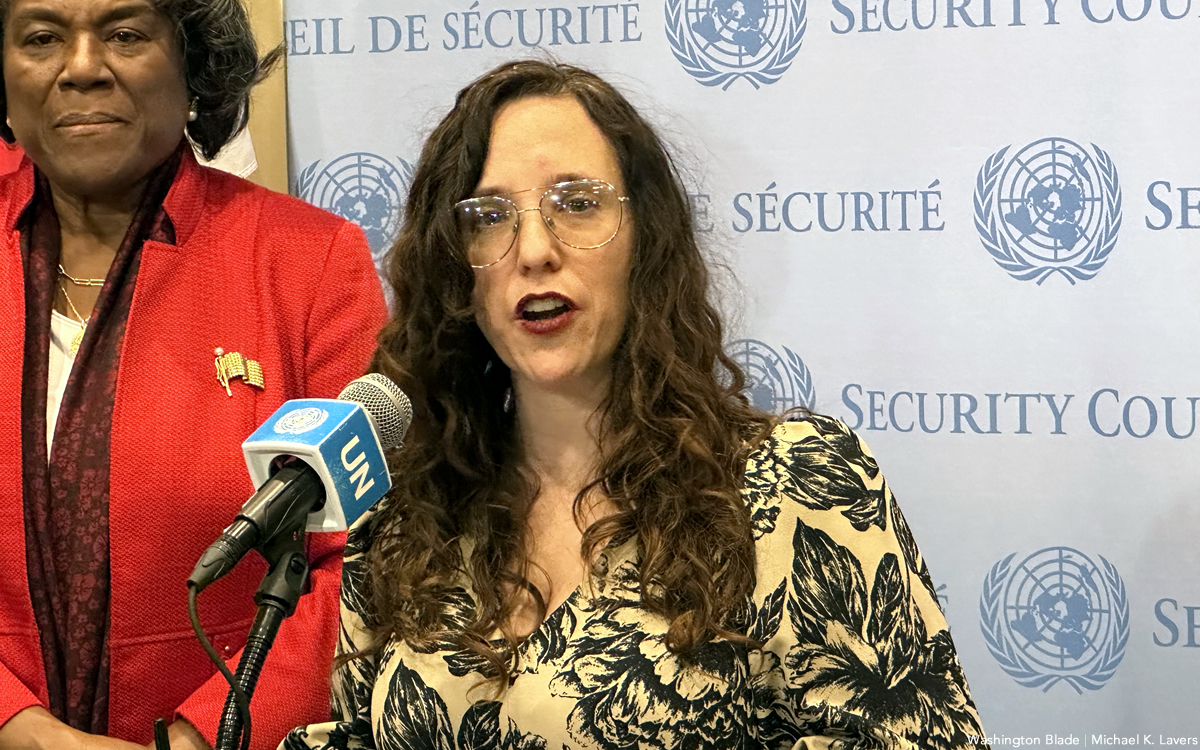
Jessica Stern, the former special U.S. envoy for the promotion of LGBTQ and intersex rights, says the work that she and her colleagues did under the Biden-Harris administration is “being systematically dismantled.”
“As the person who was responsible for leading U.S. foreign policy on LGBTQI+ issues, it’s been very difficult for the past two months to see that work being systematically dismantled,” she told the Washington Blade on March 19 during a telephone interview.
Stern was the executive director of Outright International, a global LGBTQ and intersex advocacy group, when then-President Joe Biden appointed her in June 2021.
The promotion of LGBTQ and intersex rights was a cornerstone of the Biden-Harris administration’s overall foreign policy. These efforts specifically included the decriminalization of consensual same-sex sexual relations and marriage equality efforts in countries where activists said they were possible through the legislative or judicial processes.
The Trump-Vance administration’s decision to freeze most U.S. foreign aid spending for at least 90 days has had a devastating impact on the global LGBTQ and intersex rights movement. President Donald Trump’s executive order that bans the State Department from issuing passports with “X” gender markers has prompted Germany and several other European countries to issue travel advisories for transgender and nonbinary people who are planning to visit the U.S.
Stern said the Trump-Vance administration “has studied the anti-LGBTQI strategies of other countries and basically imported the worst ideas from around the world: The most violent, the most dehumanizing, the most targeting strategies.” Stern added these policies have emboldened Hungarian Prime Minister Viktor Orbán, Russian President Vladimir Putin, Argentine President Javier Milei and other anti-LGBTQ heads of state.
“It’s one thing when a small country that has limited global reach implements anti-LGBTQI laws and policies. It’s another thing when one of the world’s superpowers does so,” Stern told the Blade. “There’s no question that the U.S.’s regression on LGBTQI rights is actually going to accelerate backlash against LGBTQI people around the world.”
“We provide political legitimacy to those ideas, but also we’re forging new alliances and coalitions, and we’re pushing these ideas on other countries,” she added. “So, it’s not a passive action. The U.S. government currently is actively funding and disseminating anti-LGBTQI hatred around the world.”
Former State Department colleagues ‘afraid every day’
The Trump-Vance administration in a Feb. 3 statement that defended its efforts to dismantle the U.S. Agency for International Development noted examples of the organization’s “waste and abuse” included $2 million for “sex changes and ‘LGBT activism'” in Guatemala and $1.5 million to “advance diversity, equity and inclusion in Serbia’s workplaces and business communities.” Secretary of State Marco Rubio last month said 83 percent of USAID contracts have been cancelled, and the remaining will “now be administered more effectively under the State Department.”
Rubio after the Trump-Vance administration froze nearly all U.S. foreign aid spending issued a waiver that allowed the President’s Emergency Plan for AIDS Relief and other “life-saving humanitarian assistance” programs to continue to operate.
The Blade has previously reported PEPFAR-funded programs in Kenya, South Africa, and elsewhere have suspended services and even shut down because of a lack of U.S. funding. UNAIDS Executive Director Winnie Byanyima on March 24 said 6.3 million more people around the world will die of AIDS-related complications over the next four years if the U.S. does not fully restore its foreign assistance.
Stern said her former State Department colleagues are “afraid every day.”
“They never know, ‘Am I going to be fired today?’ “Am I going to be put on administrative leave?’,” she said. “I cannot even imagine what it’s like to go to work every day.”
Stern told the Blade her former colleagues tell her that “there’s not a lot of foreign policy work happening because there’s so much disruption being caused by DOGE (the Department of Government Efficiency).”
“Entire departments have been decimated,” she said, noting one of them has lost 60 people. “It’s almost inconceivable to figure out how to restructure your work when your resources have been decimated.”
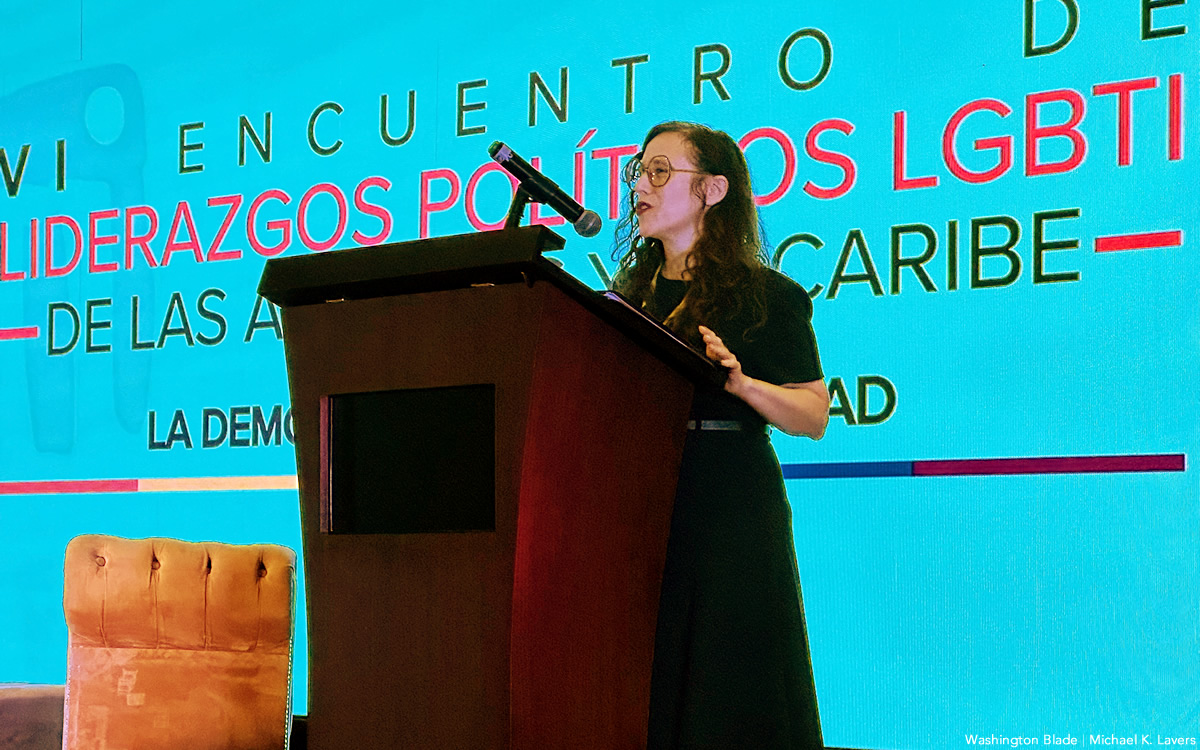
Stern described herself as “an eternal optimist” when the Blade asked whether she thinks the U.S. can ever stand for LGBTQ and intersex rights abroad.
“You have to believe in human rights,” she said.
Stern said former Secretary of State Antony Blinken as “an ally on LGBTQI issues.” Stern also said many of her now former State Department colleagues thanked her and her team for their work before they left government.
“There’s so much compassion from straight and cisgendered allies, from career officials, people that are not human rights experts or specialists, people that don’t focus on the well-being of LGBTQI people, but people that care very much about the United States standing for its values, the rule of law, equality for all, and this notion that it is in our national interest to ensure that there is safety, prosperity, and well-being for people around the world,” she said.
“The situation we find ourselves in will not last forever,” added Stern. “What we have to do is figure out how to hold the line right now, and how to organize for the future.”
She stressed ways to “hold the line” include litigation, protests, letters-to-the-editor, demanding accountability from lawmakers.
“There’s so much to do,” said Stern.
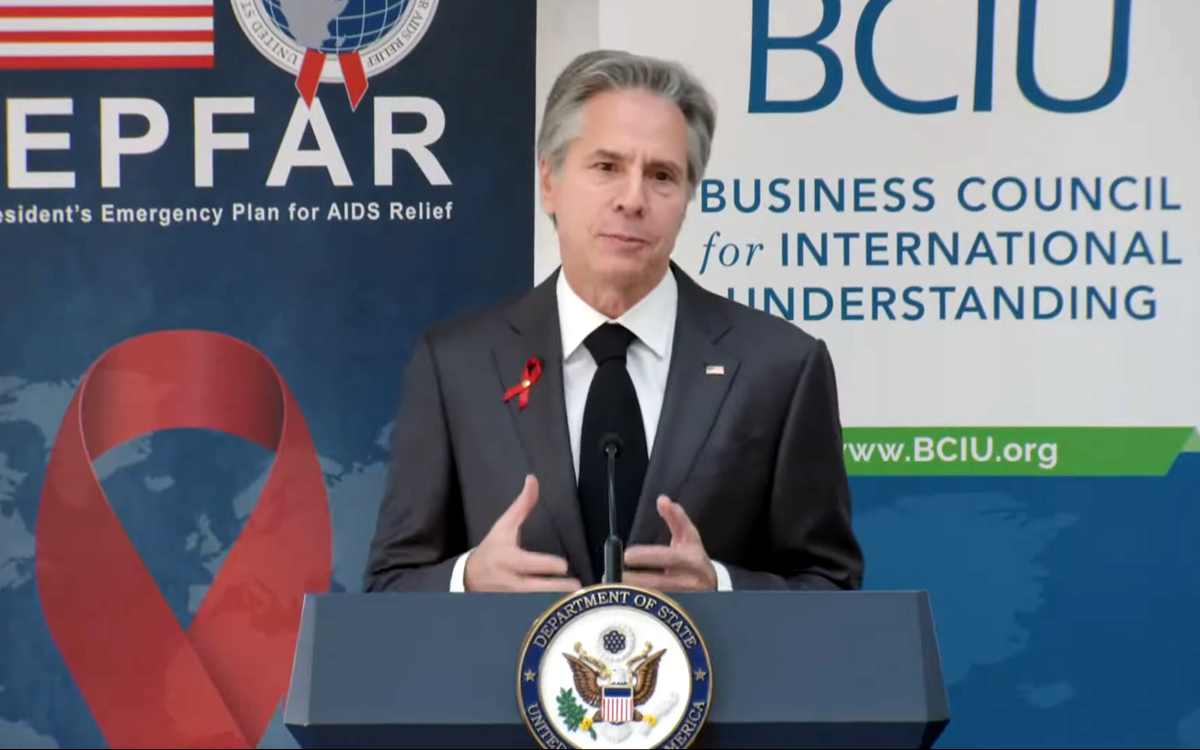
Stern is currently teaching at Columbia University’s School of International and Public Affairs, and is writing about her experience as the “first-ever human rights expert to be the special U.S. envoy for LGBTQI rights.” Stern also told the Blade that she is working to launch a new organization.
“I love being an activist again,” she said. “If there was ever a time when activists are needed, it’s now.”
“I am really proud to have rejoined the resistance,” added Stern.
National
Destination Tomorrow works to empower LGBTQ community
Sean Coleman is Black transgender man who founded group in 2009
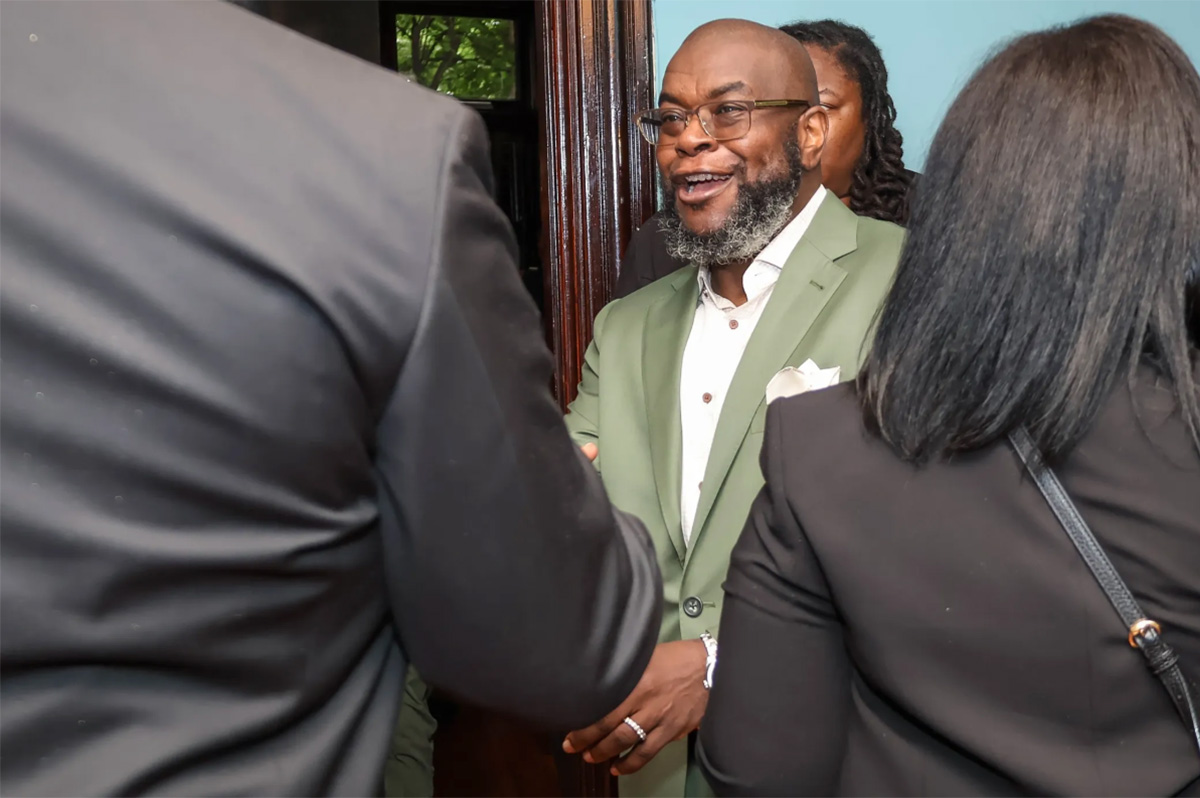
Sean Ebony Coleman became the first transgender African American to own and operate an LGBTQ center with the founding of Destination Tomorrow in 2009. Subsequent centers opened up in Atlanta in 2022 and D.C. in 2024.
Destination Tomorrow was founded on the idea that “it is more helpful to empower our most vulnerable TLGBQ+ community members in a way that takes them off the path of needing emergency care.”
“Our organization emphasizes economic, social, and mental empowerment through a variety of holistic educational, financial, support-based, housing, and health programs,” Destination Tomorrow said on the organization’s website.
With Transgender Day of Visibility today and WorldPride coming to D.C. this June, the Washington Blade spoke with Coleman to get some further insight into how Destination Tomorrow and other organizations are responding to the pressure the Trump-Vance administration is putting on the LGBTQ community.
BLADE: What was the overall reaction to the Trump administration and the heavy anti-LGBTQ rhetoric being pushed by the administration from Destination Tomorrow?
COLEMAN: I think the first thing was disbelief, right? You know he’s not well versed, but the embellishments about the community, particularly the trans community, were so outlandish that they became dangerous. So I think the first thing was, people actually believe this, and we have a message in problem because we’re not responding. We really missed an opportunity to message that differently. Like some of them it was so easy for us to respond and say, “We’re talking about the entire sports world when it comes to college and high school” and those kinds of things, right? We are definitely focusing on the wrong one percent.
I knew it was like collectively as a trans man, just personally, I was like “okay, so how do you show up now?” You’re in a position that folks expect you to at the very least have something positive to say next steps, this is what we’re gonna do, marching all this, whatever. I’m sitting with it like, no, I’m a little nervous. In the moment, most of the danger and most of the rhetoric is happening towards trans and gender nonconforming people and unfortunately, Black and brown and trans and gender nonconforming folks feel it worse when things like this happen.
BLADE: With a lot of organizations getting threats, losing funding, and everybody just being scared, has Destination Tomorrow specifically received any higher amounts of traffic to your locations, either here or other states?
COLEMAN: All three locations have seen an uptick. Funny thing a lot of them are coming in because they just want community. and we do that intake assessment. Then we say “while we have you here, we could do all of these other things.” But it’s really about them coming for community. If you know anything about us, we’re well versed in the house and ballroom community. So we put on balls. We’re planning one now.
And the young people, particularly young trans people, are also coming in for the ball, but they also want to know. Mr. Coleman, what can we do now? What is it? They want a call to action, want to be motivated and I think we have to figure out again this one message of where we’re going to go. Whether it is New York, Atlanta, and D.C., Destination Tomorrow is then going through all of the other trans into the nonconforming organizations. Speaking in one voice and figuring out what movement building looks like for us in this moment and we think that young people should drive it.
Particularly in New York and D.C. will receive some additional resources because we want to be able to address those folks that are going to come in. We want to make sure (to have enough) staff, (increase) our hours. We increase our security and our security presence because that was something that we were concerned about, even if it’s just an in person meeting that we’ve been doing for the last five years, because how do we keep those meetings and that meeting space and our identity safe?
BLADE: Do you feel like given the recent federal government layoffs and this whole Trump takeover of Washington, like, do you think D.C. is prepared or safe enough to start implementing those things that you want to try and get done?
COLEMAN: Yes. I think once we’ve taken a moment to step back and assess the situation, we will be able to come out stronger with the initiative that is going to be most important and most impactful for our community, but I think it is going to take some collaborative effort. I don’t think one agency is gonna be able to do it. I think this is a time for collaboration and allies. um, and not in that order. Right? But D.C. is definitely a safe place for LGBT community members worldwide.
It’s gonna be an amazing time. We’re gonna get an opportunity to show how resilient our community is, how much love we still receive. If you look at some things on social media, it’ll seem like everyone’s demonizing the trans and general nonconforming community and that’s not necessarily the case, right? I think we get sucked into this vacuum with social media and I think once you log off and you actually go outside, you recognize exactly how much support you have from your community. And I think that ties back into our messages. We’re not going to stand around sad and defeated. We’re going to show up, have a good time with WorldPride.
I also see it as an excellent opportunity to strategically put some plans in place. While we have you here, and we’re celebrating, we’re partying, but here is what our next steps will be. We have at least two or three next steps that collectively, you can go back down and all of us a picture goes saying two or three things. Say the same things, stay on message and I think World Pride will be an excellent opportunity to do so.
Along with the comments on TDOV and WorldPride, Coleman also spoke about the current state of LGBTQ politics.
“What’s so unfortunate for me is that we lean into our allies, right? Now is the time for our allies to take a look around the room and say “Oh wait. This person is missing [in the conversation], we should not be speaking on behalf of Black and brown people,” he told the Blade. “I specifically say Black and brown trans people. [Allies] shouldn’t be speaking on behalf of them because I know a few that can actually come here and speak on their own behalf and unfortunately it doesn’t happen. I think it’s because it’s tied into the losing funding across the board. So those LGB organizations are gonna feel that loss. And at some point they may feel like they have to step in and fill a void that they don’t necessarily have to because we’re here.”
Specifically in New York, Coleman has been looking toward the local government to help Destination Tomorrow and other organizations stay protected and operational during times like these.
“Trans, gender nonconforming and LGB issues go across different issues. Whether we’re talking about housing, criminal justice reform, or reproductive rights. We should be included in those discussions, and we should be included in those funding opportunities,” said Coleman. “And I think this gives us an opportunity to show that Destination Tomorrow has a program called Pride at Work. to the workforce development program, where we’re pitching it in D.C. and we’re actually in our third year of doing it in New York City. That’s an example of how workforce development should be for all of us, right?”
“So a lot of the work we’ve done in the last couple of months is really meeting with all our elected officials and saying, ‘This is the message that we’d like you to push. This is what we want to say, this is how we feel. Because you are not saying it, it feels like you left us behind. This is where you are missing the mark and it is up to you to fix it,’” he added.
A discussion for New York mayoral candidates took place later that evening. One of the things that Coleman wanted to heavily iterate to the candidates was that “at the end of the day, we’re paying attention now. We may not have been as politically engaged as we should have been, but we are now.”
-

 Virginia4 days ago
Virginia4 days agoFairfax County School Board issues Trans Day of Visibility proclamation
-

 Trinidad and Tobago4 days ago
Trinidad and Tobago4 days agoTrinidad and Tobago recriminalizes homosexuality
-
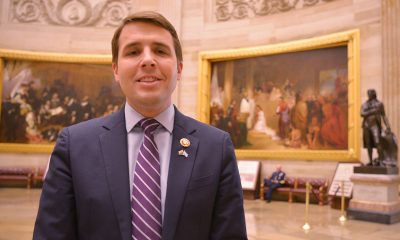
 Congress4 days ago
Congress4 days agoChris Pappas reportedly planning run for US Senate
-

 National1 day ago
National1 day agoDestination Tomorrow works to empower LGBTQ community










